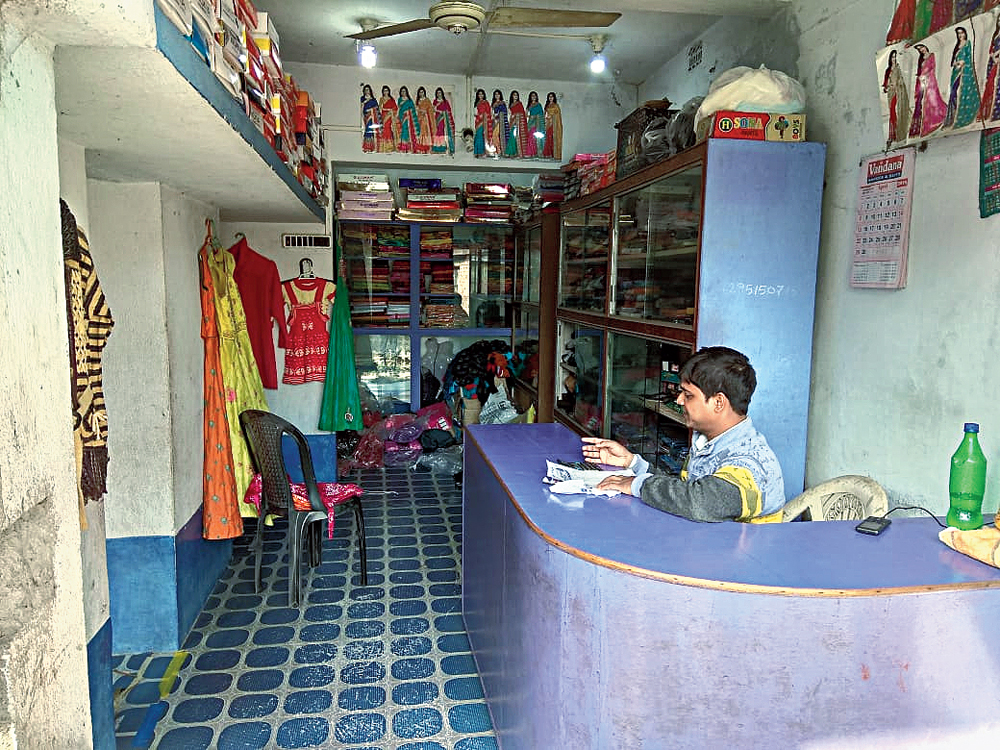Even a month ago, Gangadhari village could have been an advertisement for the “remittance economy” model.
Today, this settlement of a little over 6,000 people in Nowda bears witness to how fear of the National Register of Citizens can devastate a rural economy.
Till December, the 1,000-odd men from the village who worked as labourers in places as far away as Kerala, Indore and Hyderabad sent home monthly sums in excess of Rs 10,000 to sustain their families.
“But since December, the remittances arriving at our bank have plunged,” said an official from the United Bank of India’s Gangadhari branch, asking not to be named.
December is when the Union government’s citizenship thrust gained momentum and fears about a countrywide NRC exercise began spreading. And, driven by this fear, Gangadhari’s sons began returning home.
Their return has closed fish and meat shops in the village, depleted household meals and shrunk garment sales.
Village sources confirmed that at least 500 of Gangadhari’s 1,000 migrants had returned. One of them is Asraful Sheikh, 24, who came back from Kerala last week.
“Money is important to us, but not as important as the ability to live in our own homes,” he said.
Asraful explained that he had returned home forgoing thousands of rupees of income to correct a detail in his Aadhaar card, which misspelled his father’s first name with an extra letter.
Home to three primary schools, a madarsa and a post office apart from the bank, Gangadhari, abutting the Karimpur-Behrampore state highway, could till recently have been said to have its daily affairs sorted out.
Several villagers told The Telegraph that the UBI branch had been a lifeline for the village’s 1,000-odd families as the remittances routed through the bank kept their lives going and the local economy buzzing. Now it’s a different picture.
“Over the past month, more than four meat and fish shops in our village have closed,” said Asraful. The market area in this 3sqkm village has now dwindled to barely two fully operational meat shops selling chicken and fish.
“Mutton has vanished. I used to sell at least a quintal of chicken a day, but now it’s barely 25kg,” said Sahadat Sheikh, 30.
“Selling at least 60kg of freshwater fish a day was routine for us. Now, people are buying barely 30kg of the cheaper varieties,” said 42-year-old fish seller Kalu Chowdhury.
Apart from gutting the village economy, the migrants’ return has lent a subdued air to Gangadhari, now fallen back on the not-so-lucrative occupation of farm labour for survival.
“Several of us have now become part-time farmers just to earn Rs 100 or 200 a day, down from the Rs 1,000 or more we made as labourers in other states,” said 28-year-old Murshed Sheikh, who was in Hyderabad till last month. “We don’t know how long this will continue.”
In addition to pursuing their part-time incomes, many of the villagers are spending days or weeks at the larger post offices in the district in the hope of being issued an “Aadhaar correction slip”, which only guarantees them an appointment at least two months in the future.
The same pursuit had last week seen more than 2,000 people queue before the district’s postal headquarters in Behrampore town, some of them for more than four days.
Sources said the post office at Amtala, the one closest to Gangadhari among those issuing Aadhaar correction slips, had witnessed unusually long queues this month.
A stone’s throw from Gangadhari’s market lies a string of garment stores, and a smaller shop selling cellular equipment and recharge cards.
Manirul Shah, 35, owner of the largest garment store, said winter was normally a “down time” for sales, but this winter had been an exceptionally lean season.
“This week I have barely sold Rs 1,000 worth of goods per day. During peak season, I have done up to Rs 40,000 a day,” he said. “But plunging to 2.5 per cent of sales means something unusual is going on.”
Asraful Haque, 40, who drives a Karimpur-Behrampore government bus past this village every day, has regularly ferried hundreds of young migrant labourers between Gangadhari and Behrampore railway station.
“My bus normally has people clinging to the roof…. This month, the route to Behrampore has been half-empty all through,” he shrugged.
Babar Ali, headmaster of the Gangadhari High Madarsa and a resident of neighbouring Mokkarpur, said: “The return of so many labourers because of the NRC scare has definitely depleted disposable incomes in the area. It’s the same in many other Muslim-majority villages in the district.”










